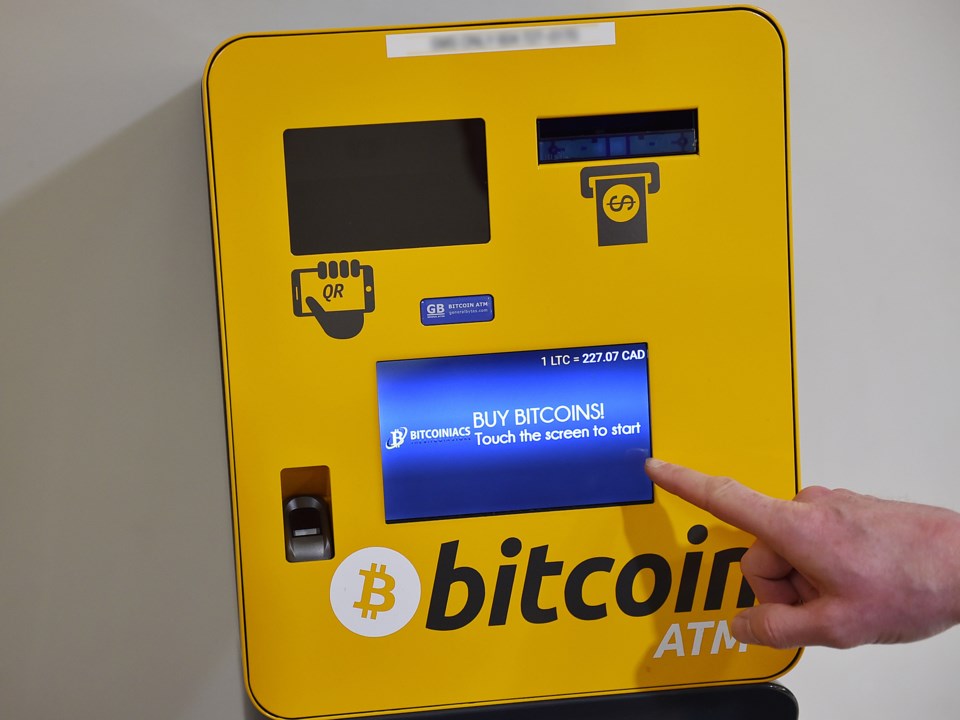The Vancouver Police Department is warning the federal government that digital currency such as Bitcoin will be used by organized crime to launder money unless more checks and balances are implemented to set up accounts and monitor those who operate automated teller machines.
Police in Metro Vancouver saw a 350 per cent increase from 2016 to 2017 in files related to digital currency. As of January, police were investigating 70 files and say they could see more than 800 cases generated by the end of year, resulting in a 300 per cent increase over last year.
“This alarming rise in cryptocurrency files is primarily due to the way Bitcoin has been adopted by fraudsters as the instrument of choice to transfer funds,” said a Vancouver police report that goes before the Vancouver Police Board Thursday.
The report points out different scams associated to digital currency, including people posing as Canada Revenue Agency employees who target mainly new immigrants and seniors. They tell them they owe money and request the money be deposited in a Bitcoin automated teller machine to a defined address.
“What is overlooked in these scams is that despite Bitcoin being an unknown concept to many victims, fraudsters easily walk them through the deposit and transfer of the money,” said the report, noting the criminals are often based overseas.
That type of crime has police worried that organized criminals will take advantage of the anonymity and non-regulated digital currency system to launder money. The report noted there is no requirement to register customer details and no limit on number of funds that can be transferred from one person to another.
The report makes reference to the provincial government’s efforts to curtail money laundering in Metro Vancouver casinos and suggests “any forward-thinking criminals will be exploring cryptocurrency and ATMs as an easier and more profitable alternative.”
The report suggests a criminal group could purchase a Bitcoin ATM—“an ideal money laundering vehicle”--for a few thousand dollars and “put all their cash through that one ATM, laundering the money as many times as required and either profit from or eliminate the transaction fee.”
The report accompanied a resolution the VPD wrote for the police board to bring before the Canadian Association of Police Governance. The resolution calls for the implementation of government amendments made to legislation known as Bill C-31, which was given Royal Assent in 2014 but not brought into force.
The bill amended the country’s proceeds of crime and terrorist financing act to include regulations for digital currency. The bill stated that any company wishing to transmit or convert digital currency would be required to register with the Financial Transactions and Reports Analysis Centre of Canada, also known as FINTRAC.
“To date, the cryptocurrency provision of Bill C-31 has never been regulated,” the VPD report said. “This is reflected in FINTRAC’s current position that those who deal in virtual currencies are not considered a money service business and are not required to register with them.”
There are 63 Bitcoin automated teller machines in Metro Vancouver, including one at Kingsgate Mall in Vancouver, according to Coinatmradar.com. Many are owned by small independent vendors. None are believed to follow any form of “know your customer” regulation, which requires personal information such as government-issued photo identification and birth date, the report said.
“All the money made by these ATMs or channelled through these ATMs may be declared as legitimate income,” the report said. “Given this lack of regulation, it is likely that Canadian organized criminals will use Bitcoin ATMs to launder their cash. However, we will likely also see foreign organized crime taking advantage of the lack of regulations.”
For example, the report said, companies in the United States are required to comply with the “know your customer” regulation, “but since they can send Bitcoin to a person in Canada, regulations here do not prevent a ‘mule’ from cashing out.”
The Courier contacted a Bitcoin machine operator in Vancouver, who didn’t want his name published for fear of retaliation by fraudsters. The operator said he voluntarily complies with FINTRAC regulations, monitors transaction amounts and takes pro-active measures for preventing crime, including posting warning signs on machine screens about the latest scam.
“We cooperate very closely with the VPD and we work with other legitimate Bitcoin ATM operators to try to minimize these frauds,” he said, confirming the police’s concerns about organized crime infiltrating the digital currency world. “There are the players who want to voluntarily [follow the rules] and there are those who want to kind of skip it.”
He pointed out government regulations won’t necessarily help victims of scams because they are unwillingly cooperating with people they think are representing the Canada Revenue Agency or some other organization used by fraudsters to commit crime.
“There’s nothing we can do to stop it because the person sending the money is legitimate,” he said.
When Bitcoin was created in 2008, it was seen as a libertarian alternative to the centralized banking system and absent of government control. The framework of the technology, however, has left “an avenue of exploitation for those with criminal motivations,” the report said.
“The lack of regulatory framework allows criminal groups to explore a myriad of ways that they can exploit Bitcoin ATMs and exchanges,” the report said. “They can commit fraud, launder money and turn Canada into a haven for international criminal funds. Implementing the cryptocurrency provisions from Bill C-31 would not eliminate these problems. However, they would restrict them at their source and severely limit their ability to flourish.”
@Howellings



